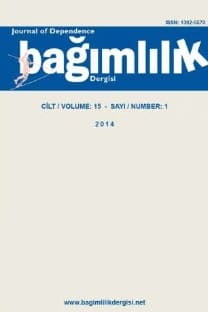Babaların Madde Kullanımı Tedavisine Katılımları Üzerine Nitel Bir Araştırma
bağımlılık, madde kullanımı, baba, babalık, madde kullanımı tedavisi
A Qualitative Study on Fathers' Participation in Substance Use Treatment
addiction, substance use, father, fatherhood, substance use treatment,
___
- 1. Bagner DM, Eyberg SM. Father involvement in parent training: when does it matter? J Clin Child Adolesc Psychol 2003; 32(4): 599–605.
- 2. Begum F, Mahmood SI. Exploring psychological correlates of peers and fathers of drug addict adolescents. Dhaka University Journal Of Biological Sciences 2019; 28(1): 9-20.
- 3. Bess B, Janus S, Rifkin A. Factors in successful narcotics renunciation. Am J Psychiatry 1972; 128(7): 861-865.
- 4. Bischof G, Iwen J, Freyer-Adam J, Rumpf HJ. Efficacy of the community reinforcement and family training for concerned significant others of treatment-refusing individuals with alcohol dependence: a randomized controlled trial. Drug Alcohol Depend 2016; 163, 179–185.
- 5. Bogenschneider K, Wu M, Raffaelli M, Tsay JC. Parent influences on adolescent peer orientation and substance use: the interface of parenting practices and values. Child Dev 1998; 69(6): 1672–1688.
- 6. Caliendo C, Senese VP, Cantone D. Parental rejection, addiction and current fathering: a comparative study. Rivista Di Psicologia Clinica 2017; 1: 59-69
- 7. Coombs RH, Landsverk J. Parenting styles and substance use during childhood and adolescence. J Marriage Fam 1998; 50(2): 473-482.
- 8. Copello A, Velleman R, Templeton L. Family interventions in the treatment of alcohol and drug problems. Drug Alcohol Rev 2005; 24(4): 369–385.
- 9. Creswell JW. Nitel Araştırma Yöntemleri: Beş Yaklaşıma Göre Nitel Araştırma ve Araştırma Deseni. Bütün M, Demir SB. (Çevirenler) 2. Baskı, Ankara: Siyasal, 2016.
- 10. Eldred CA, Brown BS, Mahabir C. Heroin addict clients description of their families of origin. Int J Addict 1974; 9(2): 315-320.
- 11. Garey AI, Arendell T. Children, work, and family. Hertz R, Marshall NL (editors). Working Families: The Transformation Of The American Home, University of California Press, 2001.
- 12. Gearing RE, Selkirk EK, Koren G, et al. Perspectives of mothers with substance use problems on father involvement. J Popul Ther Clin Pharmacol 2008; 15(1): e99-e107.
- 13. Hornberger S, Smith SL. Family involvement in adolescent substance abuse treatment and recovery: What do we know? What lies ahead? Child Youth Serv Rev 2011; 33(Suppl 1): S70–S76.
- 14. Kahyaoğlu G, Dinç M, Işık S, Ögel K. Effects of engaging family in addiction treatment for substance use and treatment compliance: A preliminary study. Addicta 2020; 7(4): 229-233
- 15. Kelley ML, D’Lima GM, Henson JM, Cotten C. Substance-abusing mothers and fathers’ willingness to allow their children to receive mental health treatment. J. Subst. Abuse Treat 2014; 47(1): 106–111.
- 16. Kirby KC, Marlowe DB, Festinger DS, et al. Community reinforcement training for family and significant others of drug abusers: A unilateral intervention to increase treatment entry of drug users. Drug Alcohol Depend 1999; 56(1): 85-96.
- 17. Leshner AI. (1997). Addiction is a brain disease, and it matters. Science 1997; 278(5335): 45–47.
- 18. Mackenzie CS, Scott T, Mather A, Sareen J. Older adults’ help-seeking attitudes and treatment beliefs concerning mental health problems. Am J Geriatr Psychiatry 2008; 16(12): 1010–1019.
- 19. Orford J. Empowering family and friends: a new approach to the secondary prevention of addiction. Drug Alcohol Rev 1994; 13(4): 417–429.
- 20. Ögel K. Bağımlılık ve Tedavisi Temel Kitabı. 1. Baskı. IQ: İstanbul. 1990
- 21. Parent J. Forehand R, Pomerantz H, et al. Father participation in child psychopathology research. J Abnorm Child Psychol 2017; 45(7): 1259–1270.
- 22. Shek DTL, Zhu X, Dou D, Chai W. Influence of family factors on substance use in early adolescents: a longitudinal study in Hong Kong. J Psychoactive Drugs 2019; 52(1): 66-76.
- 23. Strauss A, Corbin J. Basics of Qualitative Research. New York: Sage, 1990.
- 24. Strega S, Fleet C, Brown L, Dominelli L, et al. Connecting father absence and mother blame in child welfare policies and practice. Child Youth Serv Rev 2008; 30(7): 705-716.
- 25. Şimşek M, Dinç M, Ögel K. Determinants of the addiction treatment drop-out rates in an addiction counseling centre: a cross-sectional study. Psychiatr. Clin. Psychopharmacol 2019; 29(4): 446-454.
- 26. Wang J, Simons-Morton BG, Farhart T, Luk JW. Socio-demographic variability in adolescent substance use: mediation by parents and peers. Prev Sci 2009; 10(4): 387–396.
- 27. Wong JJ, Cucciare MA, Booth BM, Timko C. Predicting substance use patterns among rural adults: the roles of mothers, fathers, and parenthood. Fam. Proc 2019; 58(2): 431-445.
- 28. Yıldırım A, Şimşek H. Sosyal Bilimlerde Nitel Araştırma Yöntemleri. 10. Baskı Ankara: Seçkin. 2016.
- 29. Yoon S, Pei F, Wang X, et al. Vulnerability or resilience to early substance use among adolescents at risk: The roles of maltreatment and father involvement. Child Abuse Negl 2008; 86: 206-216
- ISSN: 1302-5570
- Yayın Aralığı: 4
- Başlangıç: 2000
- Yayıncı: -
Bahadır DEMİR, Şengül ŞAHİN, Muhammet SANCAKTAR, Emine Nur SARGIN, Zeynep KÖSE, Abdurrahman ALTINDAĞ
Seval CÜCELER, Mualla YILMAZ, Serpil TÜRKLEŞ
Oğuzhan YAVUZ, Seval ERDEN ÇINAR
Melisa Yudum TABAK, Süleyman KAHRAMAN
Madde Kullanan Ergenlerde Psikiyatrik Eş Tanı, Bağımlılık Profili ve Tedavi İsteği: ÇEMATEM Verileri
Canan KUYGUN KARCI, Asiye ARICI GÜRBÜZ, Fatma AKKUŞ ÖZDEMİR, Dilek ALTUN VARMIŞ, Ayşegül YOLGA TAHİROĞLU
Figen ÜNAL DEMİR, Esma AKPINAR ASLAN, Sedat BATMAZ, Zekiye ÇELİKBAŞ, Gökben HIZLI, Hüseyin ÜNÜBOL
Sigara Bırakma Polikliniğine Başvuran Bireylerde Tedavi Başarısını Etkileyen Faktörler
Derya KOCAKAYA, Hatice ŞENOL, Sezer ASLAN, Ahmed Mahmud ÇIRAKOĞLU, Merve ÇAKIR, Hatice TELCİ, Mehmet ÇETİNKAYA, Sehnaz OLGUN, Ayşe Nilüfer ÖZAYDIN, Ceyhan BERRİN
İnternet Tabanlı Sorunlu Alışveriş Davranışı: Çevrimiçi Alışveriş Bağımlılığı
Ergenlerin Instagram Bağımlılık Düzeyleri ile Psikolojik İhtiyaçları Arasındaki İlişki
